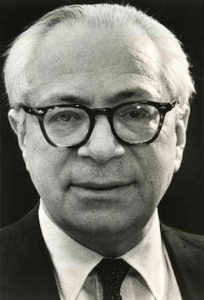Max Weinreich
 (1894–1969), Yiddish linguist, literary scholar, and public intellectual. Born in Kuldiga, Latvia (then in Russia; Ger., Goldingen), Max Weinreich grew up in a German-speaking home and first took an interest in Yiddish as a teenager. His native region, Courland, had a large German population as well as a significant number of German-speaking Jews, although the historical language of the Jewish community was Yiddish. Weinreich attended Saint Petersburg University and did graduate studies in linguistics at Marburg University, where he completed his doctorate in 1923. His dissertation is entitled “Studien zur Geschichte und dialektischen Gliederung der jiddischen Sprache” (Studies in the History and Dialect Distribution of the Yiddish Language, published in 1993 with the title Geschichte der jiddischen Sprachforschung [History of Yiddish Linguistics]). In 1923, Weinreich also published his first book in Yiddish, based on his dissertation and titled Shtaplen (Rungs). It includes four essays on the history of Yiddish philology and literature.
(1894–1969), Yiddish linguist, literary scholar, and public intellectual. Born in Kuldiga, Latvia (then in Russia; Ger., Goldingen), Max Weinreich grew up in a German-speaking home and first took an interest in Yiddish as a teenager. His native region, Courland, had a large German population as well as a significant number of German-speaking Jews, although the historical language of the Jewish community was Yiddish. Weinreich attended Saint Petersburg University and did graduate studies in linguistics at Marburg University, where he completed his doctorate in 1923. His dissertation is entitled “Studien zur Geschichte und dialektischen Gliederung der jiddischen Sprache” (Studies in the History and Dialect Distribution of the Yiddish Language, published in 1993 with the title Geschichte der jiddischen Sprachforschung [History of Yiddish Linguistics]). In 1923, Weinreich also published his first book in Yiddish, based on his dissertation and titled Shtaplen (Rungs). It includes four essays on the history of Yiddish philology and literature.
While Weinreich was first and foremost a linguist, other topics he wrote about included psychology (he translated Freud into Yiddish), sociology, economics, theater studies, literary history, education, ethnography, and philosophy. He had a second career as a writer of popular articles in the Yiddish Forward, frequently under the unlikely pseudonym Sore Brener. His linguistic interests included the history of linguistics, orthography, grammar (he coauthored an early Yiddish grammar), etymology and the etymological components of Yiddish, dialectology, stylistics, and the influence of traditional Jewish culture in all its facets on the development of the Yiddish language.
In 1925, on the initiative of the linguist Nokhem Shtif, the Yidisher Visnshaftlekher Institut (Yiddish Research Institute; YIVO) was founded in Berlin and began its work in Vilna; its first headquarters was located in a room in Weinreich’s apartment. Weinreich quickly became the driving force behind the new institute (which was originally to have been known as an academy, but Weinreich insisted on institute). Although YIVO may not have been Weinreich’s brainchild, it was his child in every other way, even after it acquired its own building on Wiwulski Street in Vilna.
When World War II broke out on 1 September 1939, Weinreich and his elder son, Uriel (who would become a renowned linguist in his own right), happened to be in Denmark, on the way to a linguistics conference. The two made their way to New York; Weinreich’s wife, Regina (daughter of Tsemaḥ Szabad), and his younger son, Gabriel, followed the next year. Once it became clear that YIVO would not be able to function in Vilna for the duration of the war, Weinreich saw to it that the American branch, which had been founded at the same time as the institute itself, now became the de facto main branch. Weinreich served as research secretary of the Linguistic Section of YIVO in 1925; as a member of the board of directors in 1929; and as research director from 1940 to 1950. He was also professor of Yiddish at City College in New York City.
Weinreich was the impetus behind an impressive series of academic publications in Yiddish both before and after the founding of YIVO, beginning with Yidishe filologye (1924) and followed by the three volumes of Filologishe shriftn, which were published by the Linguistic Section of YIVO, and the numerous volumes of Historishe shriftn, published by the Historical Section; Ekonomishe shriftn, published by the Economic-Statistical Section; and Psikhologish-pedagogishe shriftn, published by the Psychological-Pedagogical Section; YIVO’s short-lived popular linguistic journal, Yidish far ale; and YIVO’s general academic journal, YIVO-bleter. He was also an editor of and contributor to many of these publications.
Source: Yivo

